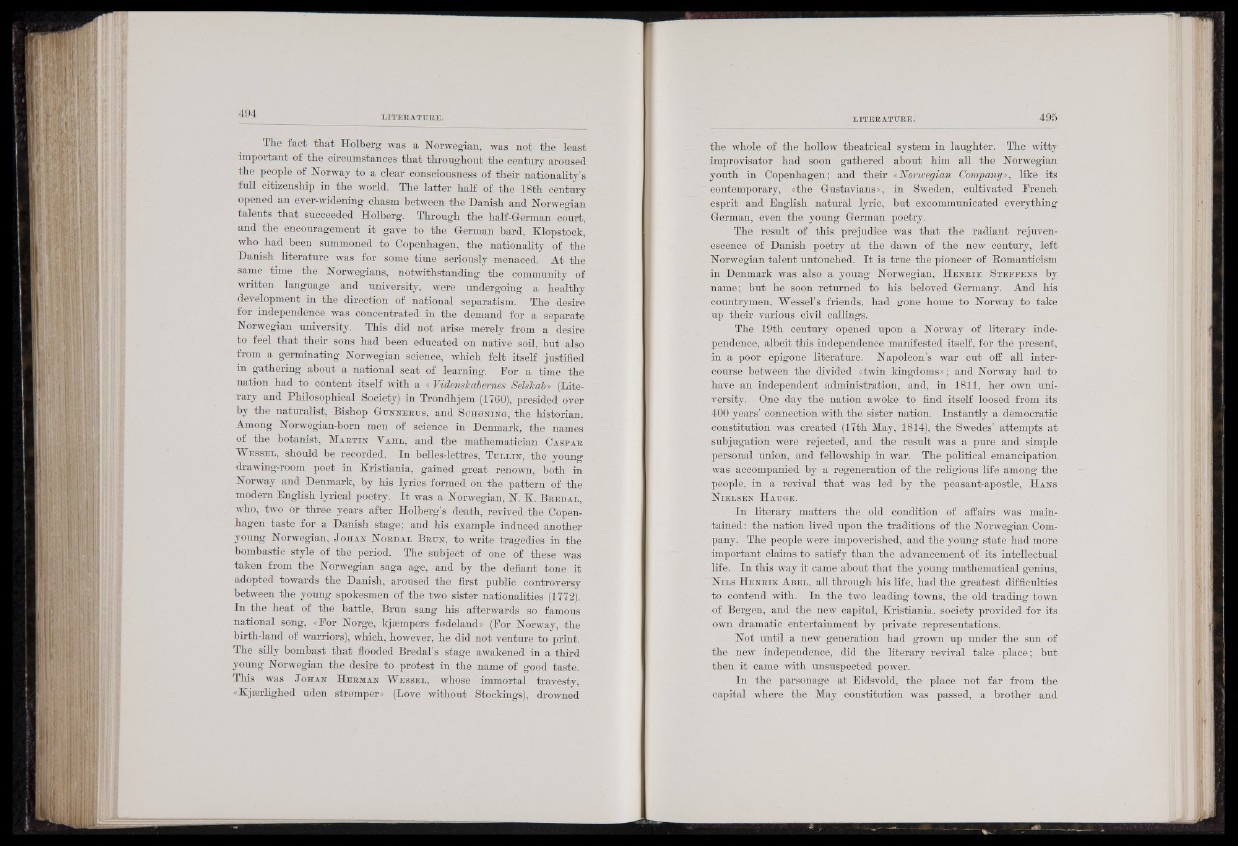
The fact that Holberg was a Norwegian, was not the least
important of the circumstances that throughout the century aroused
the people of Norway to a clear consciousness of their nationality’s
full citizenship in the world. The latter half of the 18th century
opened an ever-widening chasm between the Danish and Norwegian
talents that succeeded Holberg. Through the half-German court,
and the encouragement it gave to the German bard, Klopstock,
who had been summoned to Copenhagen, the nationality of the
Danish literature was for some time seriously menaced. At the
same time the Norwegians, notwithstanding the community of
written language and university, were undergoing a healthy
development in the direction of national separatism. The desire
for independence was concentrated in the demand for a separate
Norwegian university. This did not arise merely from a desire
to feel that their sons had been educated on native soil, but also
from a germinating Norwegian science, which felt itself justified
in gathering about a national seat of learning. For a time the
nation had to content itself with a « Videmhabernes Selshab* (Literary
and Philosophical Society) in Trondhjem (1760), presided over
by the naturalist, Bishop G u n n e r u s , and S c h o n in g , the historian.
Among Norwegian-born men of science in Denmark, the names
of the botanist, M a r t in V a h i.. and the mathematician C a s p a r
W e s s e l , should be recorded. In belles-lettres, T u l l i n , the young
drawing-room poet in Kristiania, gained great renown, both in
Norway and Denmark, by his lyrics formed on the pattern of the
modern English lyrical poetry. I t was a Norwegian, N. K. B r e d a l ,
who, two or three years after Holberg’s death, revived the Copenhagen
taste for a Danish stage; and his example induced another
young Norwegian, J o h a n N o b d a l B b u n , to write tragedies in the
bombastic style of the period. The subject of one of these was
taken from the Norwegian saga age, and by the defiant tone it
adopted towards the Danish, aroused the first public controversy
between the young spokesmen of the two sister nationalities (1772).
In the heat of the battle, Brun sang his afterwards so famous
national song, «For Norge, kjeempers fodeland» (For Norway, the
birth-land of warriors), which, however, he did not venture to print.
The silly bombast that flooded Bredal’s stage awakened in a third
young Norwegian the desire to protest in the name of good taste.
This was J o h a n H e r m a n W e s s e l , whose immortal travesty,
«Kjserlighed uden stromper» (Love without Stockings), drowned
the whole of the hollow theatrical system in laughter. The witty
improvisator had soon gathered about him all the Norwegian
youth in Copenhagen; and their «.Norwegian Company», like its
contemporary, «the Gustavians», in Sweden, cultivated French
esprit and English natural lyric, but excommunicated everything
German, even the young German poetry.
The result of this prejudice was that the radiant rejuvenescence
of Danish poetry at the dawn of the new century, left
Norwegian talent untouched. I t is true the pioneer of Romanticism
in Denmark was also a young Norwegian, H e n r i k S t e e p e n s by
name; but he soon returned to his beloved Germany. And his
countrymen, Wessel’s friends, had gone home to Norway to take
up their various civil callings.
The 19th century opened upon a Norway of literary independence,
albeit this independence manifested itself, for the present,
in a poor epigone literature. Napoleon’s war cut off all intercourse
between the divided «twin kingdoms»; and Norway had to
have an independent administration, and, in 1811, her own university.
One day the nation awoke to find itself loosed from its
400 years’ connection with the sister nation. Instantly a democratic
constitution was created (17th May, 1814), the Swedes’ attempts at
subjugation were rejected, and the result was a pure and simple
personal union, and fellowship in war. The political emancipation
was accompanied by a regeneration of the religious life among the
people, in a revival that was led by the peasant-apostle, H a n s
N i e l s e n H a u g e .
In literary matters the old condition of affairs was maintained:
the nation lived upon the traditions of the Norwegian Company.
The people were impoverished, and the young state had more
important claims to satisfy than the advancement of its intellectual
life. In this way it came about that the young mathematical genius,
N i l s H e n r i k A b e l , all through his life, had the greatest difficulties
to contend with. In the two leading towns, the old trading town
of Bergen, and the new capital, Eristiania, society provided for its
own dramatic entertainment by private representations.
Not until a new generation had grown up under the sun of
the new independence, did the literary revival take place; but
then it came with unsuspected power.
In the parsonage at Eidsvold, the place not far from the
capital where the May constitution was passed, a brother and